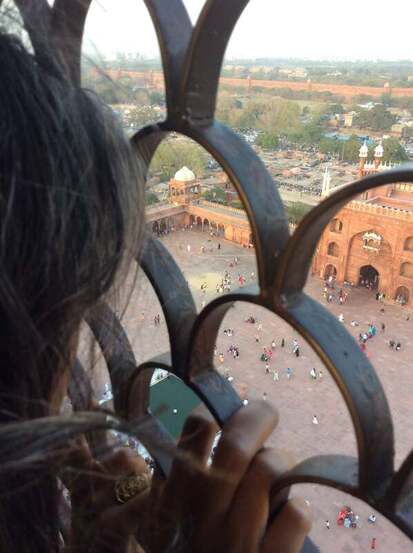
The reality is though, that India has been suffering for a long time now. Even those in India do not stop to notice. Everyone tries keep things going - because they must - even though all systems were failing. During my last 5-month journey to India 4 years ago, almost every day was spent in grief. I was heart-broken while those around were numb with the bustle of life in a country so dense with human beings that there’s almost never the luxury of having a full seat to yourself on a train. Everywhere you go, there are people. Millions of people.
I was grieving because of how close we were then to the brink of utter collapse. We were only one more drought away from a massive water and food shortage. One more hurricane away from a situation we would not be able to recover from. I didn't think it then, but - one more pandemic away - from being brought to our knees.
And I was angry at human beings' incapacity to recognize this imminent threat. But it isn’t any one person's fault. Not even Modi, India's current right-wing dictator. No. India - like so many nations formed through European imperial rule - had been drained of its resources, and derailed from its capacity for autonomous self-rule, for centuries. What is happening in India now is not merely a failure of modern democracy, or of one corrupt government.
What’s happening now is the failure of a long line of corrupt leaders and governmental structures wedded to global corporate rule— an abusive marriage that began with the East India Company in 1608. It is a failure of the capitalist system as a whole to provide for the basic needs of human beings in alignment with this planet. It is a failure of the collective human heart & mind to discern between false progress (all that glitters) to a real progress of which Ghandi spoke of in the last century— Swaraj— self-rule. Self-autonomy, self-subsistence. He advocated for a local and national ethic by which India would not be reliant on foreign powers for its basic needs and health— food, water, clothing, housing, and all industry.
Before the British, there was no poverty in India. The water was clean. The food was whole. Farmers were not fighting for the right to save seeds. People were not dying in masses because India was (and still is) home to two of the most ancient and comprehensive systems of healthcare in the world.
Yet rather than true autonomy, India chose another path— one that in many ways, was already chosen for it. That path has led us to where we are now— facing the mass deaths that were, quite honestly, impending. How ironic and tragic then, that people are dying for lack of oxygen- now bought and sold on the black market. The metaphor should not be lost on us: India cannot breathe. But our air quality, our quality of life, was already severely compromised. What is happening now constitutes a mass ethnic cleansing of those who have always existed on the margins in a colonial paradigm that never recognized them as people, but rather as raw labor for producing commodity.
Headed to Jama Masjid in the mornings, I learned from the people who lived on the street as I watched them get ready in the morning— how much dignity they cultivated within lives so profoundly marginal. It was not pity they were asking for. It was respect. Respect for every human life to live, to feed one’s family, to have somewhere on this earth to be at home. And although as a nation, India has failed to embrace the truth of Swaraj, its people have always been incredibly resilient, adaptable and persistent. Life wants to continue itself….
I am not heartbroken now. Because my heart was already broken. India was already broken. Now the question is: can that which has for so long been broken – ever be mended? The question of our times.
There is no excuse for any of this— for masses of people dying. But please do not point the finger at this moment in time, as though it were isolated from a long and complex history. Do not seek simplistic answers, because they will not work, and never have. Western comforts are paid for by Black and Brown bodies. It has been this way for centuries. Pity is not needed. Radical change is.
I needed to speak on this, because India is my homeland. And because I am creating a project this summer which is about visioning a more just and beautiful future for all of us, with dozens of Black and Brown women in the center. I see this work as being in solidarity with the people of India, and with the peoples of the Global Majority. I also recognize that it is a privilege to have, for lack of a better phrase - “first world” concerns - about fundraising for an art project, when my own country is dying. But this is not new. I have lived with a kind of persistent heartache for this land since I realized that what was broken in me wasn’t just mine— but a grief for the displaced lands whose minerals partially comprise my bones. Motherland.
Please make it through.
 RSS Feed
RSS Feed